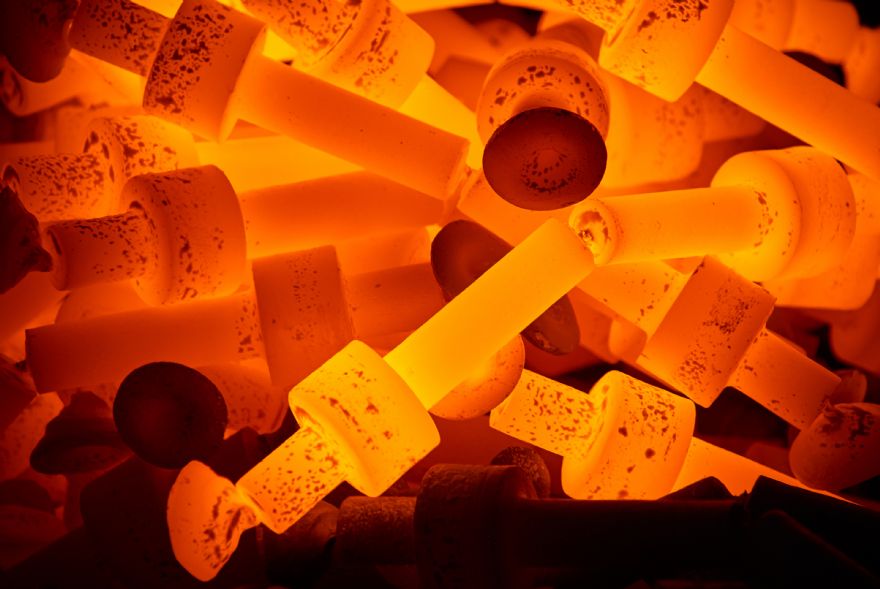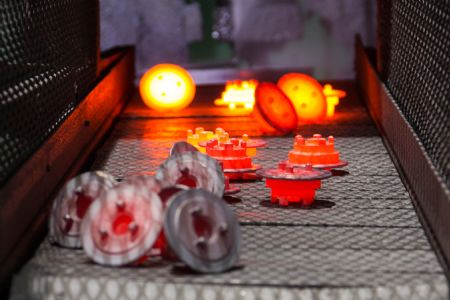
Although forging fluid products have not changed significantly in the last 20-40 years, the requirements for industrial businesses have evolved more dramatically. Today, more specific and technically-advanced lubricants are needed as a variety of components are often forged within the same industrial plants and the high pressures and temperatures generated in the hot and warm forging process demand lubricants that can extend the life of machinery parts and dies by protecting them from corrosion and improving surface quality.
Lubrication performance is a combination of chemistry and lubricant application. Even though there has been progress in forging processes, dies, forging presses and alloys quality, lubrication remains a very important technical factor for forgings quality, dies life and overall productivity — which all may rely heavily on individual lubricant product performance.
Frank Belloy, senior business development manager of hot and warm forging at
Quaker Houghton, said: “That is why Quaker Houghton has designed specific forging performance laboratory tests to understand our customers’ problems and help solve them — ensuring that we remain their reliable and trusted partner for forging fluid solutions.”
A unique testing processTo achieve this, Quaker Houghton, can now offer its customers a unique testing process for water-based lubricants (80-85% of all forging fluids used in industry) completed on-site at its forging customer solutions centre.
Mr Belloy continued: “At Quaker Houghton, we prepare a variety of different in-house tests once all the necessary steps and outcomes have all been agreed with clients. Then we are able to adapt and evolve the testing procedures as necessary. For example, cooling testing might involve anything from a single test up to 10 tests before gaining the right results.
“The different laboratory tests are crucial because it enables us to know that when we recommend a product, the different performance attributes of that particular product will precisely match our customers’ expectations. Then we can tweak formulations and make changes accordingly.

Quaker Houghton’s laboratory tests allows it to define the performance of each product based on the concentration and application that reduces the cost of use in four key ways: optimise die life by regulating temperature and applying sufficient protection in cold and hot areas; increase productivity through better cooling performance; reduce product consumption by applying the necessary dilution rate; and improve the working environment.
Mr Belloy added: “Forging lubricant production trials typically require productivity loss, equipment and additional resources to evaluate a lubricant. Often the customer uses the forging lubricant for the manufacture of different forgings shape, different alloys, and sometimes on different forging machines. This means that there are many and varied constraints including contact time, strain rate and temperature. That is why a compromise also must be found between the easiest and most difficult parts made with the same lubricant.”
There are five questions asked in the forging lab at Quaker Houghton to determine performance characteristics: how to protect dies during a long sliding distance under high pressure by applying a sufficiently thick and resistant lubricating film in all areas (hot and warm), without clogging?; how to reduce the temperatures of hot zones in order to reduce the coefficient of friction but also to postpone the starting point of dies damage while ensuring that the warm zones will not become too cold?; what is the behaviour of our product use in specific recirculating system or with specific dosing system?; how difficult will it be to keep a Forging line clean?; and what advice can we give to customers?
Customers often ask whether we can improve lubrication and increase die life simply by lowering the coefficient of friction. However, how can we decrease it knowing that, for a couple of materials (die and billet), the coefficient of friction increases as a function of the following factors: temperature, contact pressure, speed, sliding distance, and thermomechanical interactions (in forging each die area, each square millimeter undergoes different variations in pressure and temperature). This ensures that the coefficient of friction will never remain a constant because it will always depend on the interaction of so many variables.
Estimate the ‘cooling performance’Mr Belloy explained: “The cooling test by spraying allows us to estimate the ‘cooling performance’, (a product’s ability to cool the die surface according to the water dilution ratio). The parameters of the cooling test by spraying are: Steel Plate Temperature 100-450°degC; Pressure: 0.2 to 6 bars; Time: 0.1 to 30sec; and Distance Nozzles-Plate: 10-20cm.
The benefits for the customer include optimising the die life by regulating the die temperature; increasing the productivity by a better cooling rate performance; and optimising product consumption by adapting the dilution as effectively as possible. The cooling test allows us to estimate the product’s ability to touch and to cool the die surface according to the concentration, the pressure and spraying time.
Mr Belloy added: “The ‘thickness test’ allows us to estimate the ‘covering and grip‘ power of our products according to the die temperature and the water dilution ratio. At the same time, two different forging fluids can be compared or a single product with different dilution ratios. The parameters of the thickness test by spraying are: Steel Plate with a Temperature gradient of ≈150degC (maxi 450degC); Pressure: 0.2 to 6 bars; Speed: 1 to 50mm/s, and Distance Nozzles-Plate: 10-20cm. The benefits for the customer are: optimising the die life by applying sufficient die protection in cold and hot areas; and optimising product consumption by adapting the necessary dilution as effectively as possible.
He concluded: “The unique way that we utilise our innovative testing procedures to improve cycle times and die life-spans helps to make Quaker Houghton a trusted and reliable partner for our customers. As a company, we are always improving and progressing by using the latest technology — and our in-house testing facilities and expertise plays a key role within that. With a wide portfolio of forging lubricants, including our new QH PRESSMAX brand, you can always rely on Quaker Houghton to deliver.”